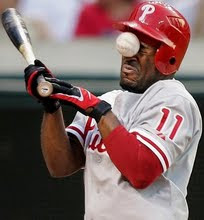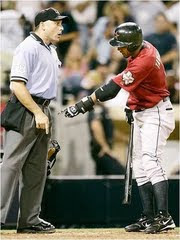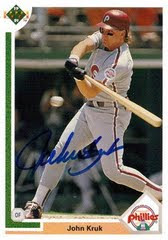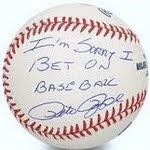In his second full season as a closer, Matt Capps followed up a 3.02 ERA/3.28 FIP 2008 season with a Brad Lidge-like 4.98 FIP (5.68 ERA). What happened? Will he regress further next season or bounce back? Should the Pirates just cut ties with the downtrodden flamethrower? Pirates GM Neil Huntington strongly hinted that Capps will probably come back next season. Is this the right move for the Pirates?
Matt Capps is traditionally a one pitch (fastball) pitcher. In 2007 and 2008, Capps burned his 92+ heat 78+% of the time and his fastball was at least a full win above average in quality. Capps had immaculate control of zone as well, posting a 4.0 K/BB in 2007 and a ridiculous 7.80 K/BB last season, despite maintaining a league average career K/9 rate of 6.88.
As such a fastball oriented pitcher, it is no surprise that Matt Capps is also a FB pitcher (0.82 GB/FB career). Considering his command of his fastball, however (a filthy 0.84 BB/9 in 2008!), it should come at no surprise that Capps rarely missed his spots therefore was not really hurt by the long ball in the past (0.57 and 0.84 HR/9 rates in 2007 and 2008, respectively).
That was that, though. This is now.
2009 was a different story for the Pirates' closer. Capps cut down his fastball usage from 78.6% last year to 69.0% this year (a 12.2% relative change in usage) and starting mixing in his very average (sub average in the past two seasons) slider more and more (from 14.8% last season to 24.3% this season). The results were not very pretty. Capps' new pitch selection resulted in some dramatic changes in command and control. His BB/9 increased by almost two full runs, to 2.75, this year and although Capps has a career high K/9 rate of 7.57 this season, he is simultaneously posting the worst K/BB of his career at 2.74 (4.20 career K/BB). This loss of command has resulted in a huge spike in long balls (1.72 HR), despite an improved and neutral GB/FB rate this season (0.99).
To add fuel to the fire, as Matt Capps' fastball quality is on a three year decline. Where it was worth almost two wins above average in 2007 and a win above average last year, Capp's fastball is slightly below average this season. Furthermore, as Capps' slider has increased in usage, it has also regressed from -0.27 runs below average per 100 pitches last season to -1.04 runs below average per 100 pitches this year.
So what does this mean for Matt Capps? Well, for one thing, it means that if Capps wants to revert to his pre-2009 level of production, he desperately needs to go back to the basics -- the things that made him successful as a reliever in the first place.
Capps has upped the mustard on his cheese a full mile per house, from a career average 92.7 MPH to a career high 93.7 average speed per pitch on the gun this year. While some extra speed is nice, it has resulted in slightly over one less inch of horizontal movement and half an inch of vertical movement. Or, in other words, Capps is throwing his fastball flatter, which is never good if you want to keep the ball in the yard. Capps should work on throttling back on the gas just a bit and putting back that little extra late life on his fastball.
Secondly, Capps needs to just plain cut down on the slider usage. Clearly, a second and even third pitch (Capps does have a change up that he mixes in around 6% of the time) give a reliver options when he needs it, but there is no reason for Capps to be increasingly reliant on poor secondary stuff when he needs to get batters out. An extra slider here and there to keep hitters off balance is fine; just don't go all slider happy on the batter -- remember, you are not Michael Wuertz.
Finally, Capps just needs some luck to return to his side. This season, Capps has become incredibly hittable and is posting a ridiculously high .363 BABIP. Coupled with the spike in walks and home runs, you can see why Capps is having such a poor season in 2009. The HR/FB rate is a bit inflated at 13.9% (league average is 11% and pitchers tend to, on average, regress to this number) and the HR/9 should therefore decline a bit next season, even if Capps does not regain the command that let him continuously post HR/FB rates below 7% in 2007 and 2008.
Capps, who made over $2 million this season, is rounding out the end of a $3 million two year deal he signed last season. With a couple more years of arbitration ahead and a subpar year this season, Capps should remain relatively cheap for the near future -- at least for 2010. Considering how overpaid relievers tend to be, I do not see the Pirates ditching Matt Capps in the offseason to avoid a potential arbitration raise because 1) the Pirates have no quality in house relief options to fill the void that Capps would leave and 2) the Pirates do not really have an abundance of resources to splurge on the open market -- even if their opening day payroll is projected to be $20 million lower next year than this year and even if the FA market continues to stay depressed. Even if Capps does not regain his 2007-2008 form, he is still a quality reliever who throws strikes. Teams like the Cubs who have plenty of power arms in the pen with poor walk rates would love to have a guy like Capps. Thus, at worst, Capps could surely provide a valuable and relatively affordable trade piece for Huntington come the trade deadline next season or even this offseason -- teams always seemed to be in desperate need of quality bullpen arms.
The Matt Capps Collapse
Posted by
David "MVP" Eckstein
on Saturday, September 26, 2009
Labels:
Fantasy Outlook,
Matt Capps







3 comments:
This guy is a loggy, right? I may be confusing him with some other closer, in a different division, of a different league, who share absolutely nothing in common.
are you as sure as you were that Vince Coleman never stole 100 bags?
Maybe i should just pay you the 5 bucks so you would shut up?
Also, the bet was "100 steals in the last 20 years" and it happened exactly 20 years before then. If we made the same bet today, i would have won.
Oh burn
Post a Comment